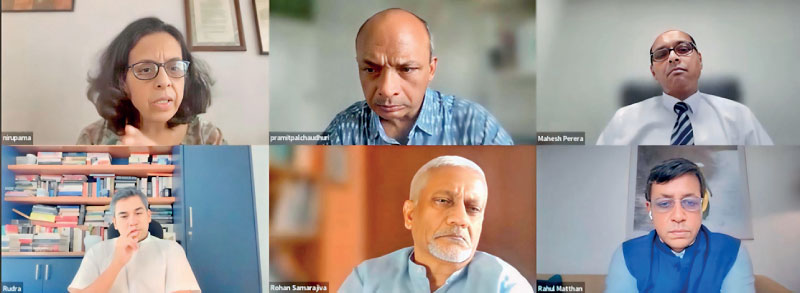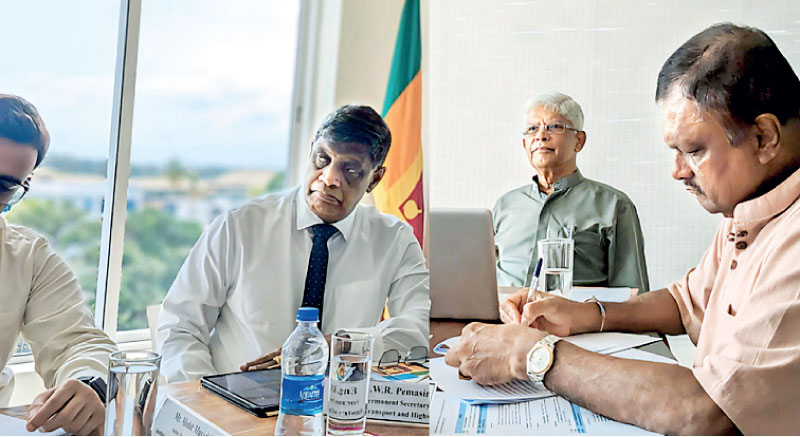Monday Feb 23, 2026
Monday Feb 23, 2026
Thursday, 25 July 2024 03:22 - - {{hitsCtrl.values.hits}}

From left: (above) The Indian Express former National Editor Nirupama Subramanian, Eurasia Group India Practice Head, Hindustan Times former Foreign Editor, and Ananta Aspen Centre Visiting Fellow Pramit Pal Chaudhuri, ICTA CEO Mahesh Perera, and (below) Carnegie, India Director Dr. Rudra Chaudhuri, LIRNEasia Chairperson Prof. Rohan Samarajiva, and Trilegal Partner Rahul Matthan

From left: Pathfinder Foundation Study Group on Envisioning India-Sri Lanka Physical Connectivity Convener and Ministry of Transport and Highways former Secretary Eng. R.W.R. Pemasiri, Pathfinder Foundation Chairman Amb. (Retd.) Bernard Goonetilleke, and Pathfinder Foundation Executive Director Dayaratna Silva
 The roundtable discussion on “Bridging Borders: Enhancing Connectivity between India and Sri Lanka” concluded successfully, fostering insightful dialogue and collaborative discussion on strengthening physical and digital connectivity between the two nations.
The roundtable discussion on “Bridging Borders: Enhancing Connectivity between India and Sri Lanka” concluded successfully, fostering insightful dialogue and collaborative discussion on strengthening physical and digital connectivity between the two nations.
The event commenced with welcome and opening remarks by Pathfinder Foundation Chairman Amb. (Retd.) Bernard Goonetilleke, and Ananta Aspen Centre Chief Executive Officer Indrani Bagchi, set the tone for a productive session. The two sessions can be viewed live on the Pathfinder Foundation web or YouTube link, https://rb.gy/11n635.
Session 1 focused on the transformative potential of Digital Public Infrastructure (DPI) in driving development across emerging markets, bringing distinguished speakers and discussants to explore how DPI can catalyse economic growth and regional connectivity.
The speakers included Trilegal Partner Rahul Matthan, and Carnegie India Director Dr. Rudra Chaudhuri. Both experts provided insightful perspectives on the role of DPI in fostering development. In this session, speakers elaborated on India’s pioneering efforts in DPI, illustrating how digital infrastructure has empowered various sectors, enhanced service delivery, and stimulated economic progress.
The discussants, LIRNEasia Chairperson Prof. Rohan Samarajiva, and Information and Communication Technology Agency (ICTA) CEO Mahesh Perera, further enriched the dialogue by bringing in the Sri Lankan perspective. They discussed the potential benefits of adopting a robust DPI framework in Sri Lanka, highlighting how it could streamline government services, improve transparency, and boost economic activities.
The session highlighted India’s significant strides through DPI, demonstrating its capacity to drive economic progress, improve public service delivery, and foster innovation. It also delved into the potential advantages for Sri Lanka in adopting a similar approach. This session underscored the transformative power of DPI and set the stage for continued dialogue and collaboration between India and Sri Lanka in leveraging digital technologies for mutual growth and development.
Session 2 was dedicated to exploring the current state and future potential of physical connectivity between India and Sri Lanka. This session brought together leading experts to discuss the multifaceted aspects of physical and maritime connectivity, highlighting the challenges and opportunities for infrastructure development and regional cooperation.
The speakers for this session included Pathfinder Foundation Study Group on Envisioning India-Sri Lanka Physical Connectivity Convener and Ministry of Transport and Highways former Secretary Eng. R.W.R. Pemasiri, and Port of Colombo South Asia Gateway Terminals CEO Romesh David.
Eng. Pemasiri provided a comprehensive overview of the physical connectivity between the two countries, discussing the various modes of transport, including roads, railways, bridges, and ports. He outlined the key challenges that hinder seamless connectivity and emphasised the importance of strategic infrastructure projects to overcome these obstacles. David complemented this by focusing on maritime connectivity, elaborating on the critical role ports play in facilitating trade and economic integration. He highlighted ongoing and proposed projects that aim to enhance port infrastructure and improve the efficiency of maritime transport.
The discussants, The Indian Express former National Editor Nirupama Subramanian, and Adani Colombo West International Terminal Ltd. CEO Harikrishnan Sundaram, added depth to the discussion with their insights. They addressed enhanced connectivity’s broader geopolitical and economic implications, discussing how improved infrastructure can strengthen bilateral relations and promote regional stability. They provided a detailed analysis of the potential for public-private partnerships in financing and implementing these infrastructure projects, drawing on successful case studies and highlighting best practices.
This session thoroughly examined the strategic importance of strengthening physical and maritime connectivity between India and Sri Lanka. It discussed the findings from past feasibility studies on proposed projects, such as sea bridges for road and rail transport and energy infrastructure. It explored additional infrastructure initiatives that could further enhance cross-border connectivity.
Overall, the session on connectivity highlighted the significant opportunities for enhancing physical and maritime connectivity between India and Sri Lanka. By addressing the existing challenges and leveraging collaborative initiatives, both nations can significantly boost their economic development and regional integration, paving the way for a more interconnected and prosperous future. The roundtable helped provide a platform for an open dialogue and develop actionable recommendations for policymakers in both countries. The collaborative efforts and shared insights will prepare the groundwork for a stronger, more interconnected future between India and Sri Lanka.